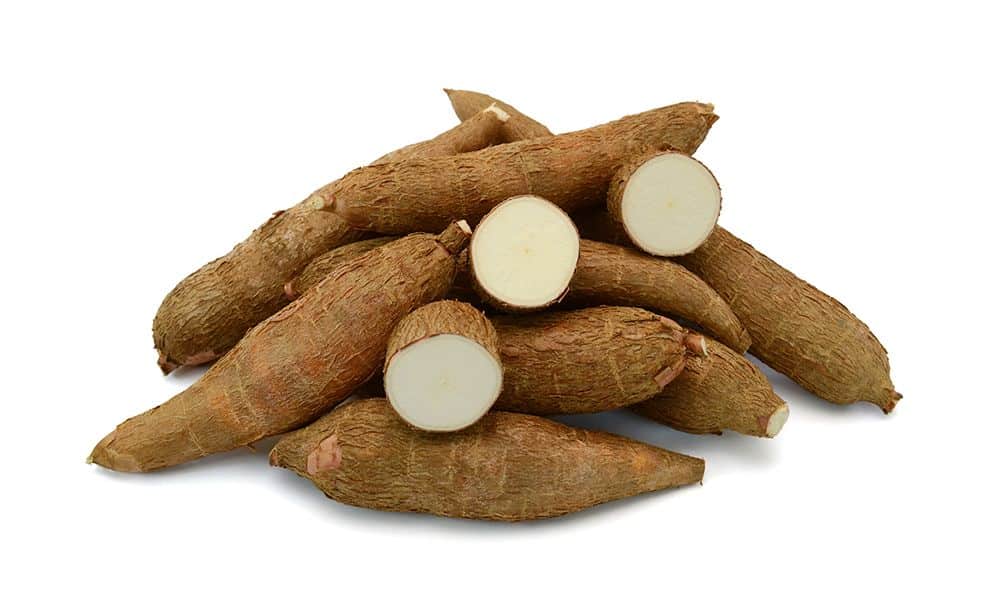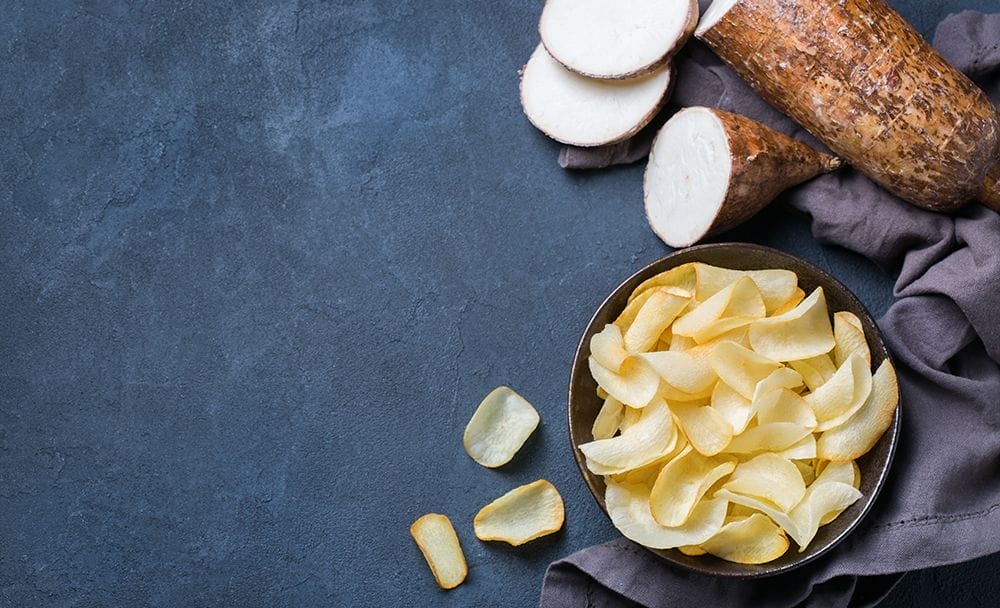
Cassava, scientifically known as Manihot esculenta, is a starchy root vegetable that is widely consumed as a staple food in many tropical regions, particularly Africa, for its low water requirements, the ability to thrive in marginal soils, and adaptability in terms of harvest timing. [1] Also known as manioc, yucca, and tapioca, it is native to Latin America and is now cultivated and consumed globally. Cassava is highly valued for its versatility, the nutritional composition of its tuber, and numerous health benefits. [2]
This article aims to provide an in-depth exploration of what is cassava, including its nutritional value, benefits, uses, potential side effects, and more.
Nutritional Value of Cassava
Cassava is a nutrient-dense food that provides several essential nutrients. Here are some key nutritional components of cassava:
Carbohydrates:
Cassava is primarily composed of carbohydrates, making it an excellent energy source. It is particularly rich in starch and offers a carbohydrate production that is significantly higher than rice or maize. [2]
Dietary Fiber:
Cassava contains significant amounts of dietary fiber which aid in digestion, and overall gut health. [4]
Vitamins:
Cassava is a good source of various vitamins, including vitamins A, B, and C. [2] It is known for being rich in vitamins B1, B2, and C and carotenes. [5]
Minerals:
Cassava plant provides minerals such as iron and zinc. [2] These minerals are essential for proper bone health and electrolyte balance.
Health Benefits of Cassava
Cassava offers several health benefits when consumed as part of a balanced diet. Some notable cassava benefits include:
Energy Boost:

Due to its high carbohydrate content, cassava provides a significant energy boost, making it a valuable source of sustained energy for physically demanding activities. [2]
Digestive Health:
The dietary fiber in cassava flour and cassava starch support digestive health by promoting regular bowel movements, preventing constipation, and supporting a healthy gut microbiome. [6]
Antioxidant Properties:
Cassava contains antioxidants, including vitamin C, which help protect the body against oxidative stress, scavenge free radicals, and may reduce the risk of chronic diseases. [4]
Gluten-Free Alternative:
Cassava contains antioxidants, including vitamin C, which help protect the body against oxidative stress, scavenge the harmful free radicals, and keep chronic disease at bay. [4]
Anti-Inflammatory Effects:
Some compounds found in cassava, such as flavonoids and terpenoids, have demonstrated anti-arthritic and anti-inflammatory properties, which may help reduce inflammation in the body. [4]
Other benefits:
Cassava has also been seen to have anti-diabetic effects as well as a preventive and first-line therapy role on cardiovascular diseases. The presence of carotenoids also has beneficial effects on metabolic diseases, eye diseases, and some types of cancers while Lutein helps with age-related macular degeneration and diseases like Alzheimer’s. [4]
Culinary Uses of Cassava
Cassava is a versatile ingredient in cooking and offers numerous culinary applications. Here are some common uses of cassava:
Staple Food:
In many regions, cassava is a primary staple food and is used as a substitute for rice, wheat, or corn. It can be boiled, mashed, or made into flour for various culinary preparations. [3]
Flour and starch:
Cassava flour, made from dried and ground cassava root, is used in making pasta, noodles, baking bread, cookies, and cakes. It is cooked to make a dry and crunchy meal known as farofa that is used as a condiment, toasted in butter, or eaten alone as a side dish. Starch is the main constituent of cassava root, and it offers most of the functions of maize, rice, and wheat starch. [3]
Chips and Snacks:

Cassava can be sliced into thin rounds or strips and deep-fried to make crispy chips or snacks. Pellets and semolina are also popular snacks. [3]
Fermented Products:
Fermented products from the cassava plant include Farinha (made from the Cassava root) and gari (a granular flour-like product) that contains significant amounts of protein and fat. Fermentation enhances the nutritional profile and digestibility of cassava. [3]
Baked products:
Various types of baked products can be produced using cassava flour, including biscuits, cookies, snacks, cakes, pastries, rusks, puffs, cupcakes, strudels, waffles, and doughnuts. It is used to create gluten-free cookies and bakery items by replacing wheat flour with cassava flour. [3]
Potential Side Effects and Precautions
While cassava plant offers numerous health benefits, it is important to be aware of certain potential side effects and precautions:
Cyanide Content:
Cassava contains a naturally occurring compound that can release cyanide when consumed in large amounts. However, proper processing techniques, such as soaking, boiling, and fermenting, significantly reduce the cyanide content and make cassava safe for consumption. [3]
Allergies:
Some individuals may be allergic to cassava or develop allergic reactions. [7]
Goitrogenic Properties:
Cassava contains goitrogens, substances that can interfere with thyroid function and iodine uptake. [8]
Processing and Preparation:
Improper processing or preparation of cassava, especially the consumption of raw or undercooked cassava, can result in cyanide toxicity. It is essential to follow proper cooking methods, such as boiling, to reduce cyanide levels and ensure safe consumption. [3]
FAQs
1. What are the benefits of cassava in Ayurveda?
Ayurveda recognizes the importance of balancing the three doshas (Vata, Pitta, and Kapha) for overall well-being. Yuca or cassava in Hindi is believed to help balance the Doshas, particularly Vata and Pitta doshas, when consumed in moderation and according to individual constitutions. In Ayurveda, cassava is considered to have a cooling effect on the body. It is often used to balance excessive heat and inflammation, providing a soothing and cooling effect.
2. Is cassava good for Vata Dosha?
Yuca, or cassava in Hindi is considered beneficial for balancing Vata dosha when consumed in moderation and prepared appropriately. Vata dosha is associated with qualities such as dryness, coldness, lightness, and irregularity. Cassava, being starchy and nourishing, can help counterbalance these Vata qualities.
It is considered nourishing and grounding, which can help pacify the lightness and instability associated with Vata dosha. Vata dosha tends to have dry qualities, and cassava’s natural moisture content can provide hydration and lubrication to support optimal Vata balance. Vata dosha is prone to digestive irregularities. Cassava, with its high fiber content, can help support healthy digestion and regulate bowel movements, reducing Vata-related digestive disturbances such as constipation or gas. Cassava is also believed to have a calming effect on the nervous system, which can be beneficial for individuals with imbalanced Vata dosha, who may experience anxiety, restlessness, or insomnia.
3. Is it all right to eat cassava every day?
Eating cassava in moderation is recommended as safe for most people. However, cassava contains cyanide compounds that can be harmful if taken in large amounts or if not properly processed.
Conclusion
Yuca or cassava vegetable in Hindi is a versatile root vegetable that offers various health benefits and culinary applications. It is a prominent source of carbohydrates, dietary fiber, vitamins, and minerals. When consumed as part of a balanced diet, Cassava can provide sustained energy, support digestive health, and offer antioxidant properties. However, precautions should be taken to properly process and prepare cassava to minimize cyanide content. When consumed responsibly and as part of a varied diet, cassava can be a valuable addition to a nutritious and diverse culinary repertoire.
Disclaimer:
This article is written from a health and wellness perspective and is not medical advice. Kindly seek the help of a certified medical practitioner before initiating any treatment.
References:
- Cassava: The Nature and Uses
- Introductory Chapter: Cassava as a Staple Food
- Cassava: A Potential Food Source for Value-added Product Developments in Sri Lanka
- Nutrition, Healthcare Benefits and Phytochemical Properties of Cassava ( Manihot esculenta) Leaves Sourced from Three Countries (Reunion, Guinea, and Costa Rica)
- Cassava: Nutrient composition and nutritive value in poultry diets
- Tuber flours improve intestinal health and modulate gut microbiota composition
- Allergy to cassava: a new allergenic food with cross-reactivity to latex
- Milling reduces the goitrogenic potential of cassava


















